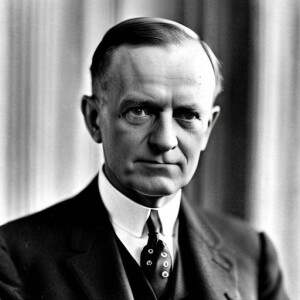
Calvin Coolidge, the 30th President of the United States, was a man of quiet strength and unwavering principles. Born on the Fourth of July in 1872 to a family of Vermont farmers, Coolidge rose to national prominence during the Boston Police Strike of 1919. His calm and steady leadership during the crisis earned him a reputation as a decisive and effective leader.
In 1920, Coolidge was chosen as Vice President under Warren G. Harding, and after Harding’s sudden death in 1923, he became President. During his presidency, Coolidge continued his predecessor’s pro-business policies and oversaw a period of unprecedented economic growth, known as the “Roaring Twenties.” He signed into law the Revenue Act of 1924, which lowered income tax rates and increased the personal exemption, putting more money in the pockets of hardworking Americans.
Coolidge was also a champion of peace, supporting the Kellogg-Briand Pact, which renounced war as an instrument of national policy. He recognized the growing importance of radio broadcasting and established the Federal Radio Commission to regulate the industry.
Despite his popularity and success as a leader, Coolidge declined to seek a second full term in 1928, citing his belief in limited government and the dangers of becoming too entrenched in power. After leaving office, he retired to Massachusetts, where he wrote his autobiography and made occasional public appearances.
While some praise Coolidge’s commitment to small government and individual liberty, others criticize his lack of action on issues such as civil rights and labor reform. Regardless of one’s opinion, Coolidge’s legacy as a president who championed free enterprise and limited government continues to influence American politics to this day.
